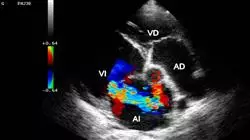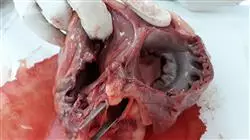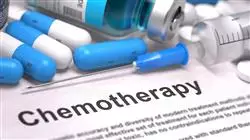University certificate
The world's largest faculty of medicine”
Description
This training will provide you with a sense of security in medical practice, which will help you grow personally and professionally”

The specialist plays a fundamental role in the approach to the oncological process, and his diagnostic and therapeutic orientation is key. But equally, there are components of the disease process that require special monitoring to avoid risks and facilitate the greatest possible wellbeing for the patient.
Cardiotoxicity is routinely present as one of the side effects of many of the treatments for the oncology patient. The management of the medication, as well as of other therapeutic options, is fundamental in the adjustment of the appropriate dosage for medical practice, and its undesired effects must be managed with the utmost rigor. Keeping up to date with advances in cardiotoxicity in oncology patients is a key factor for doctors in their daily clinical practice.
This program is designed to facilitate the specialist's updating process, so that he/she can include in the clinical practice of their patients all the innovations and the latest knowledge about oncological therapeutics and its complications.
Update your knowledge with the Postgraduate diploma program in The The Comprehensive Management of Cardiotoxicity in the Oncologic Patient"
The Postgraduate diploma contains the most complete and up to date scientific program on the market. The most important features of the program include:
- Development of case studies presented by experts in The Comprehensive Management of Cardiotoxicity in the Oncologic Patient. The graphic, schematic, and eminently practical contents with which they are created provide scientific and practical information on the disciplines that are essential for professional practice
- New developments in cardiotoxicity of oncologic etiology
- It contains practical exercises where the self-evaluation process can be carried out to improve learning
- With special emphasis on innovative methodologies in cardiotoxicity
- All of this will be complemented by theoretical lessons, questions to the expert, debate forums on controversial topics, and individual reflection assignments
- Content that is accessible from any fixed or portable device with an Internet connection
Update your knowledge with the Postgraduate diploma program in The Comprehensive Management of Cardiotoxicity in the Oncologic Patient"
Its teaching staff includes professionals belonging to the field of cardiotoxicity in cancer patients, who bring to this training the experience of their work, in addition to recognized specialists belonging to prestigious reference societies and universities.
The multimedia content developed with the latest educational technology will provide the professional with situated and contextual learning, i.e., a simulated environment that will provide immersive training program to train in real situations.
The design of this program is based on Problem-Based Learning, by means of which the student must try to solve the different professional practice situations that arise throughout the course. For this, the student will be assisted by an innovative interactive video system developed by recognized experts in the field of cardiotoxicity in oncology patients, with extensive teaching experience.
Increase your decision-making confidence by updating your knowledge through this Postgraduate diploma"

Make the most of this opportunity to learn about the latest advances in the approach and follow-up of cardiotoxicity in cancer patients, and improve the care of your patients"
Syllabus
The structure of the contents has been designed by a team of professionals from the best hospitals and universities in the country, aware of the relevance of current training to be able to intervene in the toxic effects of oncological therapies at the cardiac level, and committed to quality teaching through new educational technologies.

The Postgraduate diploma in The Comprehensive Management of Cardiotoxicity in the Oncologic Patient, contains the most complete and up to date scientific program on the market"
Module 1. Early Detection of Cardiotoxicity
1.1. Circulating Biomarkers: Troponins
1.2. Circulating Biomarkers: Natriuretic Peptides
1.3. Other Circulating Biomarkers for Early Detection of Cardiotoxicity
1.4. Echocardiography
1.5. Cardiovascular Magnetic Resonance Imaging
1.6. Computerised Axial Tomography
Module 2. Therapies with Cardioprotective Effects
2.1. Identification and Control of Cardiotoxicity Risk
2.1.1. Treatment of Traditional Risk Factors
2.1.2. Treatment of Comorbidities
2.2. Strategies to Limit Oncologic Drug-Related Cardiotoxicity
2.2.1. Anthracyclines
2.2.2. Monoclonal Antibodies. HER2 Inhibitors
2.2.3. Cell Kinase Inhibitors
2.3. Strategies to Limit Cardiotoxicity Related to Thoracic Radiotherapy
2.4. Role of Beta-Blockers in Cardioprotection
2.5. Role of Angiotensin Receptor Inhibitors and Antagonists in Cardioprotection
2.6. Other Interventions with a Possible Cardioprotective Effect
Module 3. Long-Term Monitoring Programs for Patients Who Have Received Cardiotoxic Therapies
3.1. Risk of Late Cardiotoxicity Secondary to Oncological Drugs
3.2. Monitoring Protocol for the Detection of Late Cardiotoxicity
3.3. Risk of Late Cardiotoxicity Secondary to Thoracic Radiotherapy
3.4. Monitoring Protocol for Detecting Late Radiation-Induced Toxicity
Module 4. The Future of Cardio-Oncology: Most Relevant Lines of Research
4.1. Basic Research
4.2. Clinical Research
4.3. Gaps in Evidence and Future Research
Module 5. Multidisciplinary Cardio-Oncology Units
5.1. Objectives of the Cardio-Oncology Units
5.1.1. Care Objectives
5.1.2. Research Objectives
5.1.3. Teaching and Dissemination Objectives
5.2. Components of Cardio-Oncology Equipment
5.2.1. Coordination between the In-Hospital and Out-of-Hospital Environment
5.2.2. Coordination between Different Healthcare Professionals

A unique, key, and decisive training experience to boost your professional development”
Postgraduate Diploma in Global Management of Cardiotoxicity in the Oncology Patient
The management of cardiotoxicity in oncology patients is a major challenge for healthcare professionals. Advances in cancer treatment have increased patient survival, but have also increased the risk of cardiovascular damage associated with certain treatments. As a medical professional, it is crucial to have specialized knowledge in the management of cardiotoxicity to provide comprehensive and quality care to oncology patients. At TECH Global University, we offer you the opportunity to become a specialist in this field through our Postgraduate Diploma program in Global Management of Cardiotoxicity in the Oncology Patient. Our program is delivered 100% online, giving you the flexibility to study from anywhere and at any time that fits your schedule. You will be able to access the learning materials conveniently and adapt your study pace to your professional and personal responsibilities. In addition, you will have a team of highly trained and experienced teachers in the management of cardiotoxicity.
Specialize online in one of the most important branches of medicine.
In this postgraduate course, you will acquire in-depth knowledge of the different types of cardiotoxicity associated with cancer treatments, such as chemotherapy and radiotherapy. You will learn how to identify and evaluate cardiovascular risk factors in oncology patients, as well as how to implement appropriate prevention and management strategies. In addition, you'll explore the latest research and advances in the field, including emerging cardio-oncology therapies, enabling you to deliver evidence-based, high-quality care. Become an expert in the global management of cardiotoxicity in the oncology patient and make a difference in the lives of patients facing this dual burden of disease. Our program will give you the skills and knowledge you need to excel in your career and provide comprehensive, specialized care to these patients.







